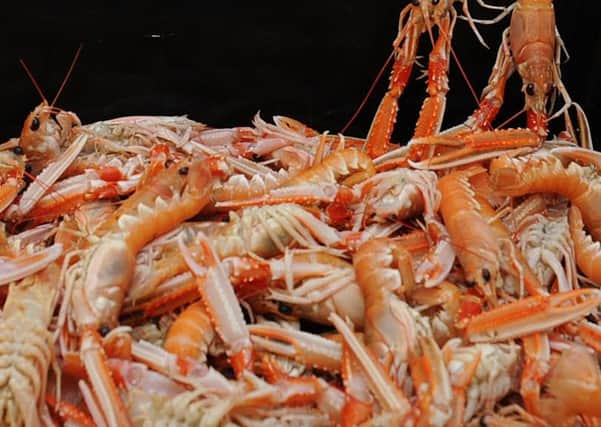The colour of the ink used on export paperwork was queried said seafood boss.


Christina MacNeil, General Manager of Isle of Barra-based fish and shellfish processing company, Barratlantic Ltd, which normally exports about 80 per-cent of its produce to the EU and employs more than 35 people on the island, made the comments this week and said that they had been “overwhelmed” with the added paperwork since the export regulations changed, and raised serious concerns about the impact of the extra costs, especially for health certificates for their fresh produce on their markets.
Ms MacNeil confirmed that the increased bureaucracy was delaying exports through their haulier’s depot, DFDS in Larkhall, and they were now facing issues getting their fresh produce to their EU markets in time.
Advertisement
Hide AdAdvertisement
Hide AdMs MacNeil also highlighted hidden increased costs they faced since the regulations changed, including a requirement for the use of heat-treated palettes in their shipping process.


Concerns were also raised by Barratlantic that the paperwork and the checks on loads as they went through customs, could further delay the process when a lorry load contained consignments from different exporters.
Resolving problems with the paperwork for any one of the export consignments on-board could delay the entire load as the checks were completed.
A spokesperson for Haulage company, DFDS which handles shellfish exports to the EU for Barratlantic many other Scottish shellfish processors, said: “Yes, unfortunately that is correct. We create detailed documents which summarise the content of the load. Each product has a commodity code and for each commodity code a summary of the product types, gross weight, net weight, number of boxes and value must be produced, which is a time consuming exercise.
Advertisement
Hide AdAdvertisement
Hide Ad“If during the consolidation an error is discovered in the paperwork the process must be reworked. If the error is discovered late in the process, for example if the declaration is rejected by the British or French Customs systems, the summaries and customs declarations must be recreated and in worst cases the vehicle off-loaded before departure. In every case, valuable time is lost.”
The company’s spokesperson said this week they had initially experienced a ‘backlog’ at their Larkhall depot due to delays in getting the necessary health certificates for the exports.
That backlog had increased as they experienced “some difficulties in the interface between DFDS’ and the authorities’ IT Systems”, and because customs documents “too often lack the quality needed to be accepted in the systems”.
But, the company’s spokesperson confirmed that since last Friday “significant progress” had been made in resolving the IT issues and “improving clarity on the requirements of the various authorities”.
Advertisement
Hide AdAdvertisement
Hide AdThe backlog has now greatly reduced, the haulier confirmed, but added that “every step of the customs procedure is taking longer than anticipated and capacity is consequently reduced.”
DFDS’s spokesperson said: “Despite our extraordinary efforts we unfortunately had to over the weekend further suspend the ‘Groupage Export Service’, which includes smaller consignments of fish and shellfish, until Wednesday this week at the earliest.
“We do this to give sufficient time to rebuild normal services and are painfully aware of the strains being put on our customers affected by this.
“We cannot stress enough the importance of having 100 per-cent accuracy on all paperwork required to export to the Continent and are working with our customers to achieve this.”
Advertisement
Hide AdAdvertisement
Hide AdDFDS also stated that the Scottish Government had been “very supportive” in the run-up to Brexit “and allocated resources where needed” with Food Standards Scotland staff located in its depot to produce the newly required Health Certificates.
DFDS’s spokesperson concluded: “This has been a very steep learning curve for everyone involved with new things being learned every day. It is clear that some suppliers are much more prepared and have a better understanding of the requirements than others, and we see many cases of invoices missing key data which prevent them being processed.
“Very shortly, we will provide our customers with an updated, more detailed specification of the requirements and it will be necessary to adopt a strict policy of not accepting shipments with incomplete or incorrect paperwork, so as not to jeopardise other customer’s consignments sharing the trailer.
“We understand the frustration of our customers and our staff on both sides of the Channel are working extremely hard to overcome the challenges which are being thrown up every day.”
Advertisement
Hide AdAdvertisement
Hide AdJimmy Buchan, Chief Executive of the Scottish Seafood Association said that the export businesses were “having to endure a mountain of paperwork”.
He said that the industry did know that there would be an increase in export bureaucracy post-Brexit but said that it was “the level of scrutiny and a lack of standards across the paperwork” that was now causing problems with different countries having different interpretations “of what they looked for in that paperwork”.
Mr Buchan said that he had just been in a call with DEFRA (The Department for Environment, Food and Rural Affairs) that highlighted that “some of the officials at the border posts” were saying that “the colour of the ink” being used to complete the paperwork “was wrong”.
“If we are getting to the level of scrutiny that is stalling the movement of food, then I think we have got a serious problem”, Mr Buchan added, and concluded with a call for a recognised standard “for what is acceptable” across the trading nations, and that is it.”
Advertisement
Hide AdAdvertisement
Hide Ad”We cannot allow this to go to a border control post and for that individual to be able to decide that he doesn’t like the colour of the ink.”
Cllr Donald Crichton, Chairman of Comhairle nan Eilean Siar’s Sustainable Development Committee , said:
“Island exporters are experiencing shambolic conditions and bureaucracy is far worse than expected. This has been compounded by better than average weather which has led to a greater amount of product trying to get to market than is usually the case at this time of year although uncertainty is reducing fishing effort.
“Some island exporters have lost consignments, some have stopped exporting for the immediate future until things stabilise and some are trying to export and failing to get across the Channel then returning with product and freezing it which will immediately reduce future prices.
Advertisement
Hide AdAdvertisement
Hide Ad“I would favour a UK backed insurance scheme to compensate island exporters for lost consignments which are the result of circumstances outwith their control e.g. incorrect or missing product barcodes at the Channel crossing points or in EU territory.”
Western Isles MP, Angus Brendan MacNeil said: “I am aware that Barratlantic have a difficult situation now because of Brexit, which has put up barriers to their biggest market.
“There is a lot of paperwork, a lot of time and a lot of extra cost due to Brexit.
“There was no way Brexit was going to be good for anybody”, Mr MacNeil added, “I’ve said this for a number of years now, the chickens have unfortunately come home to roost. The burdens are there until we in Scotland re-join the EU.
Advertisement
Hide AdAdvertisement
Hide AdThe MP has confirmed that he is writing to the Chancellor of the Exchequer asking him to set-up a ‘Brexit relief fund’, along the same lines “as the one the EU has set up with the bulk of the money being aimed at Ireland”.
Mr MacNeil concluded: “The reality of this situation is that the worst affected part of the European community is the Highlands and Islands so the UK Gov should set up a similar fund and the bulk of that per capita should be targeted at the Highlands and Islands.
“Meantime, we just have to hope that as people get used to it, it gets lesser, but the bureaucracy unfortunately is going to remain until we rejoin the EU.”
Highlands & Islands MSP Maree Todd said that she was “deeply concerned” to hear of the backlogs and delays “currently being experienced at various borders”.
Advertisement
Hide AdAdvertisement
Hide Ad“This red tape”, the MSP claimed, “is leading to overnight delays, causing tonnes of perishable goods wasted and millions of pounds lost as a result.”
Ms Todd concluded: “…this debacle confirms what we already knew, Brexit will and is causing serious and lasting damage to jobs and businesses across the Highlands & Islands, at a time when unemployment is already soaring.
A UK Government spokesperson said: “We are working closely with the industry to help understand and address the issues they are experiencing. This includes ensuring that the UK and French systems are functioning properly to allow for quick and easy processing of information.
“We are contacting exporters, their representatives and transporters to help them understand the requirements to keep their goods moving.
Advertisement
Hide AdAdvertisement
Hide Ad“It is vital that exporters check they have entered in details correctly and ensure that they have provided the transporter of the goods with the correct documentation.
“We urge the Scottish Government to ensure they have appropriate staffing levels in place at hubs in their area to certify documentation and ensure there are no delays to food exports.
“We have given the Scottish Government nearly £200 million to prepare for leaving the EU, in order to help minimise disruption and guarantee business readiness.”